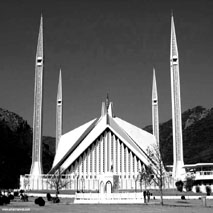Sirajuddin Aziz
ALL Praise be to Allah SWT, Who caused us to be within the fold of Islam and most fortunate to be ummati of the Holy Prophet (PBUH). At the age of forty, in the city of Makkah, he received, Prophethood. The Makkans rejected him and his message; albeit they had earlier voluntarily titled him as “Sadiq” and Ameen (The Truthful and The Custodian). The Prophet was recognised by the pagans and the infidels as a man of highest honour, in speech and in conduct. So when he invited them to the Message of Unity of God, conveyed to him, by Revelation, by Allah, the One and Only, through Arch-Angel Jibrail, the Makkans were confounded. They knew, he was both, an honest custodian and most truthful. Now to remain steadfast to their misguided beliefs and to deny, The Message, they embarked upon to persecute him and any who was considered his follower.
At age fifty, ten years into his Prophethood, he decided to visit the city of Taif, to extend them, an invitation to join and accept the Message of Islam. He called on the chieftains to abandon worship of idols, acknowledge oneness of God, and subscribe to the universal brotherhood of man. The arrogant chieftains not only rebuked and rejected him, but also treated him with ridicule and mockery. The men and street urchins pelted stones and clods upon him; his feet started to bleed. He made an exit from Taif. Painfully rejected, he rested at Qarn al-Manazil, some 90 Km’s east of Makkah, at which place appeared Angel Jibrail and said, O Prophet of Allah, I am commanded, if you so desire, to make these two opposite hills of Taif, to collide against each other, so that those who caused you pain may perish therein. But, our Prophet, as the Holy Quran testifies, who was sent as Mercy to all. (“We sent you not, save, as a Mercy for all creatures” 21:108), instead invoked a prayer and said, no. He prayed that may a day come when some of their progeny would accept Islam.
Even when he must have been at the lowest emotional ebb of his life, the Prophet demonstrated an exemplary character. “And you (stand) on an exalted standard of character” (68:4). He remained merciful. He exacted no revenge. He said no words of curse or abuse. His gentleness shone through all the trials and tribulations of disseminating The Message. He did not relent, nor waver. He pursued. The traits of character are many, some are innate, while some can be acquired. Our Prophet who was Divinely blessed with many innate qualities, also guided us, by his everyday life behaviour, that practices of good conduct can be acquired too. One of the Ummul Momenien, recorded that his conduct was replica of The Holy Quran. “At home, he was most lenient and generous. His spirits were always high, smiling and even joining in laughter at times.He was ready to give a helping hand to his wives in the ordinary work of the house….(Tabaqat Al- Kubra..Ibn Sa’d).
Our Beloved Prophet (PBUH), disliked, the use of taunt, sarcasm or harsh language. He spoke softly, in low decibels. He was shy in demeanour. “You have indeed in the Messenger of Allah a beautiful pattern of conduct “(33:21). Speaking to his son, Hussain (RA), Hazrat Ali (R.A)., described the beautiful assembly of the Prophet, “ gave everyone who sat with him his share so that no one who sat with him thought that anyone was honoured more than he was….He had the kindest and best behaviour of all people, being like a father to them. They were all equal in respect of their rights with him. His assembly was one of forbearance, modesty, patience and trust. Voices were not raised in it nor were shortcomings made public nor lapses exposed”.
Hussain (RA), insisted upon his rightly guided father, to tell him further, how he (PBUH), behaved with his Companions, Hazrat Ali said, “The Messenger of Allah (PBUH) was always cheerful, easy tempered, mild. He was neither rough nor coarse .He did not shout nor utter obscenities. He did not find fault with nor over- praise people. He ignored what was superfluous and left it. He abandoned three things in himself: hypocrisy, storing things up and what did not concern him. He also abandoned three things in respect of other people: he did not censure anyone, he did not scold them, nor try to find their secrets. He only spoke about things for which he expected a reward from Allah.” (Ash-Shifa of Qadi Iy’ad).
Here, I would like to remind my dear readers, The Holy Quran says, “ Nor does he say (aught) of his (own)”). (53:3). So, if the Prophet honours anyone or guides us, through his practices (Sunnah), how can any make it disputable. The lofty standards of character that he set for his followers, needs immediate re- visitation, for imbibing and inculcating, in our current everyday lives. Let’s remove the many taints that lie upon our souls. We must step out of the mire of our misdeeds. Let’s not speak ill of any, living or dead. Let’s enmasse indulge in ‘ tazkiyat an – nafs. (purification of soul). Let all Muslim brothers find convergence towards unity of Ummah and not provoke by speech or action, by deceit or design, dissension in our ranks. Let’s all abhor the use of curse and abuse. Let’s do what our Noble and Beloved Prophet liked and wanted us to do; righteousness of character in speech and action. May Allah SWT guide us all towards greater rectitude in our lives. Ameen.
—The writer is a Banker and freelance contributor.










